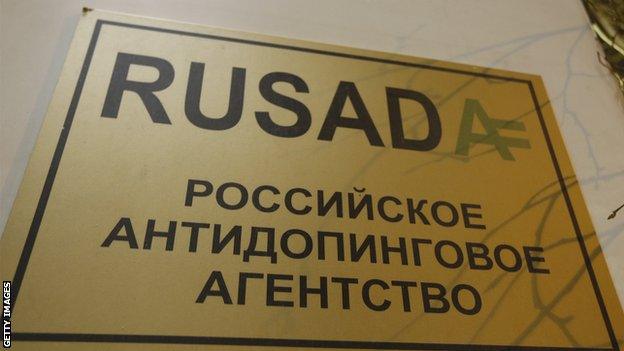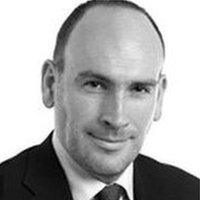Russia ban: Wada doping penalty throws up more questions than answers
- Published

Rusada's suspension was first imposed in November 2015
In January, British lawyer Jonathan Taylor, the head of the compliance committee of the World Anti-Doping Agency, warned Russia that the "toughest possible sanctions" would be imposed on the country if crucial lab data it had handed over turned out to have been tampered with.
These would "very likely include... that no Russian officials, athletes or support personnel will be permitted to participate in the Olympic or Paralympic Games", he wrote.
The message was clear. Russia was at serious risk of a complete ban.
Yet just a few months later, despite the data being found to have been outrageously manipulated, the outright blanket ban Taylor clearly threatened - and which many in the athlete and anti-doping community had demanded - was shelved in favour of a more qualified punishment.
On the recommendation of Taylor's panel, Russia has been kicked out of international events for four years, with no official team, officials, flag or anthem allowed at Olympics, Paralympics and World Championships. It is a ban on a Russian identity at these events. Nor can they host.
But as ever in the world of sporting justice, there are key caveats. Athletes who can prove they are clean can compete under a neutral banner, and many will do so - as in Pyeongchang at the Winter Olympics, when the same 'ban' applied and 168 Russians ended up taking part, winning 17 medals.
Certain continental and regional events - such as Euro 2020 and World Cup qualifying matches in football, the Sochi Grand Prix in Formula 1 - are not included in the sanction.
The decision has divided opinion.
Some, like the UK Anti-Doping Agency (Ukad), have welcomed it, believing it gets the balance right between an appropriate punishment and the rights of innocent Russian athletes.
Russia, meanwhile, is set to appeal via the Court of Arbitration for Sport (Cas), and has portrayed the sanction as excessive, unfair and politically motivated.
Others, like the US Anti-Doping Agency and some athlete representatives, have described the ban as weak and insufficient, suggesting the leadership of the World Anti-Doping Agency (Wada) was influenced by an International Olympic Committee (IOC) in hock to powerful Russian interests.
Members of Wada's own athlete committee are also considering an appeal via Cas, in the hope that a blanket ban can be enforced after all.
Taylor himself is known to be dismayed at the questioning of his integrity and stands by his recommendation.
He rejects the suggestion that Wada veered away from a blanket ban for fear it would be overturned on appeal by Cas. It is worth noting that when acting for the International Paralympic Committee (IPC) in 2016, Taylor successfully defended the principle of a blanket ban of Russian athletes at the Rio Games, when it was challenged at Cas.
Taylor has insisted that by extending the kind of qualified ban that Russia was hit with at the 2018 Pyeongchang Winter Olympics to all global events and for a period of four years, Wada has in a sense been tougher than he vowed they would back in January. While in 2016, Wada could only make recommendations of bans, which the IOC was able to ignore, now it has the power to issue such sanctions itself.
Grigory Rodchenkov speaks to BBC sports editor Dan Roan in February 2018
But in veering away from the blanket ban he threatened towards a qualified version now, Taylor has inevitably attracted some criticism.
It is understood that he and his Wada colleagues seriously considered an outright ban, but agreed with athlete representative and former South African swimmer Penny Heyns, who is a member of Taylor's panel, that it would be unfair on younger, innocent Russian athletes.
But after this latest attempted cover-up of the gravest doping scandal in the history of sport, it is difficult to understand when, if not now, Wada will ever issue the ultimate sanction of an outright ban.
"I'm not sure bans in the history of sport actually work very well," outgoing Wada president Sir Craig Reedie told the BBC's Alex Capstick in Lausanne on Monday.
Try telling that to John Jackson, Bruce Tasker, Stuart Benson and Joel Fearon - former members of Team GB's four-man bobsleigh team, who after five years were last month finally awarded their bronze medals from Sochi 2014 where they finished fifth behind two Russian crews later disqualified for doping.
Or to retired javelin thrower Goldie Sayers who had to wait 11 years before receiving her bronze medal from the 2008 Olympics this summer after Russian Mariya Abakumova was stripped of silver after a re-analysis of a sample tested positive.
Or to ex-British Paralympian Vicki Aggar who sits on the Wada athlete committee and has described Reedie's comments as "laughable and disrespectful" and has told the Guardian newspaper she is now considering resigning in protest at the decision.
Russia doping crisis in 60 seconds
It is clear to see why some believe Wada has bent over backwards for Russia.
First, as I revealed last year, it compromised on the two key criteria for reinstatement, lifting Russia's suspension before the handing over of lab data had been met, despite opposition from Wada's own vice-president Linda Helleland, the chair of its athletes committee Beckie Scott - who resigned in disgust and later told me she had felt bullied by senior officials over her opposition to the move - and anti-doping agencies like Ukad.
Then in January, when a "strict" deadline to hand over the data was subsequently missed by a fortnight, Russia was allowed to remain code-compliant. That's when Taylor spoke of a complete ban.
And now, despite the data having been found to have been doctored, and despite that manipulation of evidence now jeopardising the prosecution of as many as 145 cases of suspected Russian cheating, a blanket ban is avoided.
Wada says that, because its new sanctioning powers only came in recently, Russia can only be punished for this most recent offence - the meddling with data - and not what happened years ago at the Moscow lab. It adds that both the IOC & government representatives on its executive committee voted unanimously for the qualified ban.
But regardless, as with Rio 2016 and Pyeongchang 2018, the build-up to a third consecutive Olympic and Paralympic Games is set to be overshadowed by the issue of Russian cheating.
How many Russians will be in Tokyo? What reception will they receive? What will they be called? Will Russia successfully appeal? Will Wada's athlete committee launch an appeal of their own? Where does all this leave the entire anti-doping system?
A few months out from the opening ceremony, all is unclear.
And with the appeals and recriminations set to continue, there is still no end in sight to this most damaging of sporting scandals.
Yuliya Stepanova talks to the BBC for the 100 Women season about the cheating, cover-ups and life on the run.
